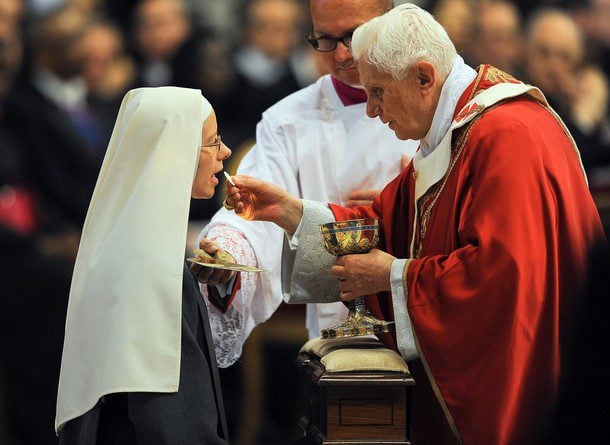So if everyone practices liturgy, as we began, and if the liturgical denominations have the most accessible and universal liturgy of them all, as we continued, and Catholics the Greatest Liturgy Ever in the Holy Mass (sorta snuck that in, didn’t I?), the question remains: why is it so great to have an accessible liturgy? Ignoring the obvious positives accessibility brings, surely that is not all liturgy is. The real question this time, I promise: what is liturgy? After all, I gave you but two of three definitions, liturgy as the form of public worship, and liturgy as tradition and repetition. These definitions are incomplete, at best. Here then, read the truth, the tantalizingly different and seemingly incongruent definition of liturgy that the Holy Roman Catholic Church clings to:
Liturgy (leitourgia) is a Greek composite word meaning originally a public duty, a service to the state undertaken by a citizen. Its elements are leitos (from leos = laos, people) meaning public, and ergo (obsolete in the present stem, used in futureerxo, etc.), to do. From this we have leitourgos, “a man who performs a public duty”, “a public servant”, often used as equivalent to the Roman lictor; then leitourgeo, “to do such a duty”, leitourgema, its performance, and leitourgia, the public duty itself.
But wait, what does that have to do with worship? you will rightly ask, throwing a brick through your computer screen. But stay with the definition for but a moment. Liturgy is a public service. It is a public duty. The Church owes its people its service. And we don’t call the RCIA liturgy, or confession, or canned food drives, or the building of chapels; yet these are clearly services the Church performs. So just because something is a service it doesn’t immediately gain the title Liturgy, which is something that we now – though we haven’t always – reserve for the Mass. Why then, is the Holy Mass almost exclusively what we mean when we say liturgy?
Well, I’ll tell you what I think. It is because the Mass centers around the fact that Jesus Christ, our Lord and God, becomes bread and wine by the power of the Holy Spirit invested in the Church: the greatest public service ever. Think about it: A divine mystery, God’s desire for intimate union with us, is made apparent, is made public, is made accessible and available to everyone, saint and sinner, theologian and idiot. That is true public service. Everything the Church does in the Liturgy of the Mass is really an imitation of this truth: When Jesus – the true public servant – took His very body and made it bread so that all might be joined to Him in a real, tangible and profound way, he gave the Church a marching order, or at the very least an important lesson: Reveal the mystery. Show my children my glory, for I have become man and bread for that very purpose; that matter itself might be used to remind them of, and envelope them in the glory of things not seen, the beauty of the home they long for. I love you far too much to be made distant, too be contained by your own inability to see me; I laugh at the Fall of Man! For I will invade the world separated from me, by the power of my Resurrection I will set up a stronghold in enemy territory, I will use the very things of the fallen world to reveal myself to you.
And so liturgy is a whole host of minor transubstantiations, and major symbols. The incense is our prayer rising to God, the candles; the light of christ, the sign of the cross; our conquering declaration, the holy water; a grace and reminder of our baptismal vows, the statues of saints, the icons and stained glass; dim windows into glorious heaven, the gestures, words and prayer of the priest; the offering, on behalf of all of us, the perfect sacrifice of Jesus Christ to God the Father for our Redemption. And so it goes, for over two-thousand years, the Liturgy of the Mass following Christ’s example, and revealing the mystery. That is my defense of Liturgy.
But this is nothing new. Christ, for the sake of the doubting, misunderstanding, disgruntled and disbelieving scribes – in whom, if we are honest, humanity can be directly paralleled – took a mystery and made it apparent so that they might understand. Know this then, and love liturgy: “Which is easier: to say, ‘Your sins are forgiven,’ or to say, ‘Get up and walk’? But that you may know that the Son of Man has authority on earth to forgive sins…” He said to the paralyzed man, “I tell you, get up, take your mat and go home.””
UPDATE
Listen to Belloc say it, kudos to http://fishinginthetiber.blogspot.com/:
“Whatever is buried right into our blood from immemorial habit that we must be certain to do if we are to be fairly happy (of course no grown man or woman can really be very happy for long — but I mean reasonably happy), and, what is more important, decent and secure of our souls. Thus one should from time to time hunt animals, or at the very least shoot at a mark; one should always drink some kind of fermented liquor with one’s food — and especially deeply upon great feast-days; one should go on the water from time to time; and one should dance on occasions; and one should sing in chorus. For all these things man has done since God put him into a garden and his eyes first became troubled with a soul. Similarly some teacher or ranter or other, whose name I forget, said lately one very wise thing at least, which was that every man should do a little work with his hands. … Now in the morning Mass you do all that the race needs to do and has done for all these ages where religion was concerned; there you have the sacred and separate Enclosure, the Altar, the Priest in his Vestments, the set ritual, the ancient and hierarchic tongue, and all that your nature cries out for in the matter of worship.”











